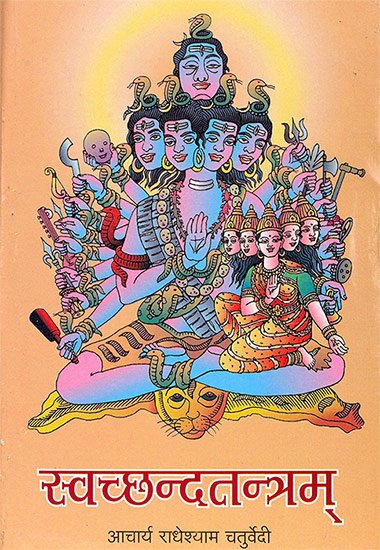Svacchanda-tantra [sanskrit]
30,869 words | ISBN-10: 8172700989 | ISBN-13: 9788172700980
The Sanskrit edition of the Svacchanda-tantra, a large work in the form of a manaul describing Kashmir Shaiva rituals. The extant Svacchandatantra contains over 3,000 shlokas (metrical verses) and highlights the worship of Svacchanda Bhairava (a fierce form of Shiva) and his consort Aghoreshvari. The text can be dated to at least the 7th century. Alternative titles: Svacchandatantra (स्वच्छन्दतन्त्र), Śrīsvacchandatantram (श्रीस्वच्छन्दतन्त्रम्, Shrisvacchandatantram)
Verse 9.83
मुटित्वा सिक्थकेनैव क्षीरमध्ये तु प्रक्षिपेत् ।
जायते परमा शान्तिः पुनरन्यन्निबोध मे ॥ ८३ ॥
muṭitvā sikthakenaiva kṣīramadhye tu prakṣipet |
jāyate paramā śāntiḥ punaranyannibodha me || 83 ||
The Sanskrit text of Svacchanda-tantra Verse 9.83 is contained in the book Sri Svacchandatantram (Set of 5 Volumes) by Dr. Paramahansa Mishra (डॉ. परमहंस मिश्र). This book is not available online so in order to read the full text and translation you should buy the book:
Buy now! Sanskrit text by Dr. Paramahansa Mishra (डॉ. परमहंस मिश्र) (2004)
Glossary of Sanskrit terms
Note: This extracts Sanskrit terms and links to English definitions from the glossary, based on an experimental segmentation of verse (9.83). Some terms could be superfluous while some might not be mentioned. Click on the word to show English definitions.
Mush, Itvan, Sikthaka, Kshira, Adhi, Pra, Jayat, Parama, Shanti, Punar, Ani, Anya, Bodha, Asmad,
Analysis of Sanskrit grammar
Note: this is an experimental feature and only shows the first possible analysis of the Sanskrit text (Svacchanda-tantra Verse 9.83). If the system was successful in segmenting the sentence, you will see of which words it is made up of, generally consisting of Nouns, Pronouns, Verbs, Participles and Indeclinables. Click on the link to show all possible derivations of the word.
- Line 1: “muṭitvā sikthakenaiva kṣīramadhye tu prakṣipet ”
- muṭ -
-
muṣ (noun, feminine)[compound], [adverb], [nominative single], [vocative single]muṣ (noun, masculine)[compound], [adverb], [nominative single], [vocative single]muṣ (noun, neuter)[compound], [adverb], [nominative single], [vocative single], [accusative single]
- itvā -
-
√i -> itvā (absolutive)[absolutive from √i]itvan (noun, masculine)[nominative single]
- sikthakenai -
-
sikthaka (noun, masculine)[instrumental single]sikthaka (noun, neuter)[instrumental single]
- aiva -
-
√i (verb class 2)[imperfect active first dual]
- kṣīram -
-
kṣīra (noun, masculine)[adverb], [accusative single]kṣīra (noun, neuter)[adverb], [nominative single], [accusative single]kṣīrā (noun, feminine)[adverb]
- adhye -
-
adhī (noun, masculine)[dative single]
- tu -
-
tu (indeclinable particle)[indeclinable particle]
- pra -
-
pra (noun, masculine)[compound], [vocative single]pra (noun, neuter)[compound], [vocative single]pra (Preverb)[Preverb]
- kṣipet -
-
√kṣip (verb class 6)[optative active third single]
- Line 2: “jāyate paramā śāntiḥ punaranyannibodha me ”
- jāyate -
-
√jai -> jāyat (participle, masculine)[dative single from √jai class 1 verb]√jai -> jāyat (participle, neuter)[dative single from √jai class 1 verb]√jai (verb class 1)[present middle third single]√jan (verb class 4)[present middle third single]
- paramā -
-
paramā (noun, feminine)[nominative single]
- śāntiḥ -
-
śānti (noun, feminine)[nominative single]śānti (noun, masculine)[nominative single]
- punar -
-
punar (indeclinable adverb)[indeclinable adverb]punar (indeclinable)[indeclinable]
- anya -
-
ani (noun, masculine)[compound], [adverb], [nominative dual], [vocative dual], [accusative dual]anī (noun, feminine)[compound], [adverb], [nominative single], [vocative single]anya (noun, neuter)[compound], [vocative single]√an -> anya (absolutive)[absolutive from √an]
- an -
-
ad (noun, masculine)[compound], [adverb], [nominative single], [vocative single]ad (noun, neuter)[compound], [adverb], [nominative single], [vocative single], [accusative single]
- ni -
-
ni (noun, masculine)[compound], [adverb]ni (noun, neuter)[compound], [adverb], [nominative single], [vocative single], [accusative single]ni (noun, feminine)[compound], [adverb]nī (noun, masculine)[adverb]nī (noun, neuter)[compound], [adverb], [nominative single], [vocative single], [accusative single]nī (noun, feminine)[adverb]ni (Preverb)[Preverb]
- bodha -
-
bodha (noun, masculine)[compound], [vocative single]bodha (noun, neuter)[compound], [vocative single]√budh (verb class 1)[imperative active second single]
- me -
-
ma (noun, masculine)[locative single]ma (noun, neuter)[nominative dual], [vocative dual], [accusative dual], [locative single]mā (noun, feminine)[nominative dual], [vocative single], [vocative dual], [accusative dual]asmad (pronoun, none)[dative single], [genitive single]
Other editions:
Also see the following editions of the Sanskrit text or (alternative) English translations of the Svacchanda-tantra Verse 9.83
Svacchandatantram (Two Volumes)
by Prof.Radheyshyam Chaturvedi (2004)
With the Commentary Svacchandodyota by Acarya Sri Ksemaraja and Jnanavati; [Sanskrit Text With Hindi Translation]; [स्व्छ्न्द्तन्त्रम]; [Chaukhambha Vidya Bhawan]
Buy now!![Svacchanda-tantra [sanskrit] - book cover](/uploads/a/Svacchanda-Tantra-Sanskrit.jpg)
